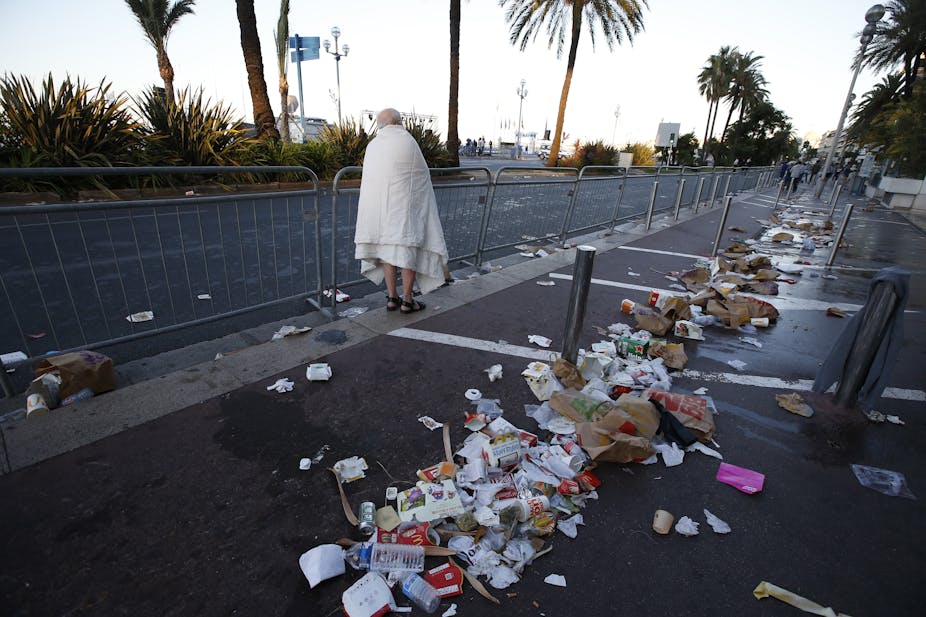Last night, we sat toasting Bastille Day, and watching a glorious fireworks display at the Eiffel Tower from our window. We were joyful, oblivious to the events unfolding in Nice, almost 600 miles away. I had been cautious as we had walked the streets of Paris early in the day, mindful of the symbolic significance of an attack in the French capital on the country’s independence day.
But I was reasonably confident that Paris security forces could guard the crowds assembling for one of the most important events of the calendar after a month of watching them scrutinize the crowds at the fanzone in Paris during Europe’s premier soccer competition, which was located less than a quarter of a mile away from our apartment.
Tragically, the attack in Nice demonstrated once again that open societies have so many vulnerable targets that the opportunities for carnage are numerous.
France has become the epicenter of terrorist violence in Europe because, in my view, of three factors. First, it still has the largest Muslim population in western Europe – at over seven percent of the population. Second, that population has become disaffected by years of economic neglect and resulting poverty. And third, France has pursued aggressive policies against jihadists in North Africa and the Middle East.
The overwhelming proportion of that Muslim population has either remained passive or engaged in democratic debate over these issues. But, in tandem, these factors have provided the environment for a minute, disaffected, homegrown and radicalized fringe to develop. And – as attacks from California and Dallas to Brussels, Paris and Nice demonstrate - it doesn’t take many people to cause chaos.
Authorities have identified Mohamad Lahouaiej Bouhel, a 31-year French-Tunisian as the attacker. There is no evidence yet of how many others orchestrated the attack. But the question of how to guard against such mayhem remains one of the insoluble problems of modern western societies.
Defense and security
I have spent much of the last two months as a visiting scholar at a research institute named IRSEM that is nestled in France’s department of defense, located at the Ecole Militaire, just across the road from the Eiffel Tower.
I have interviewed numerous defense analysts and military officials. An abiding theme has been that the traditional distinction between public security and national defense has blurred to the point where they have become indistinguishable. The French Navy guards its shores against terrorist infiltration. The Army guards its streets against terrorist attacks.
This breakdown is symbolized by the state of emergency that exists in France today, one that President Hollande had promised to end in an interview broadcast on national TV yesterday. Sadly, within hours of the attack he announced it would have to be extended.
In practice this means that France’s military forces are evident at every tourist site in Paris. It means that the rooms at a hotel across the street from our apartment are generally empty and the local traders complain of a lack of tourists this summer. It means that people view each other with suspicion. And it means that there are constant delays on Paris’ fabled Metro rail system because of “suspicious packages.”
Jihadism does not represent an existential threat to France: its very existence is not threatened. But the social fabric of life in France is fraying at the edges.
Who is the enemy?
All these events, however, must be kept in perspective.
We will never become blasé to the sight of blood on the streets of Europe’s cities, although we may have to become accustomed to it as we have in the Middle East – at least in the short term. And we should not lose sight of who is our enemy.
The assailants are indiscriminant. One press report I read in the early hours noted that one of the first victims of the Nice attack was a Muslim mother, killed as her son stood next to her.
This is not a war of religions, or of civilizations. It is a war between civility and barbarism.
So I will take in several of Paris’ most notable tourist sites today. It is the only weapon that I have.
Simon Reich is currently a visiting fellow at IRSEM, funded by the Gerda Henkel Foundation

